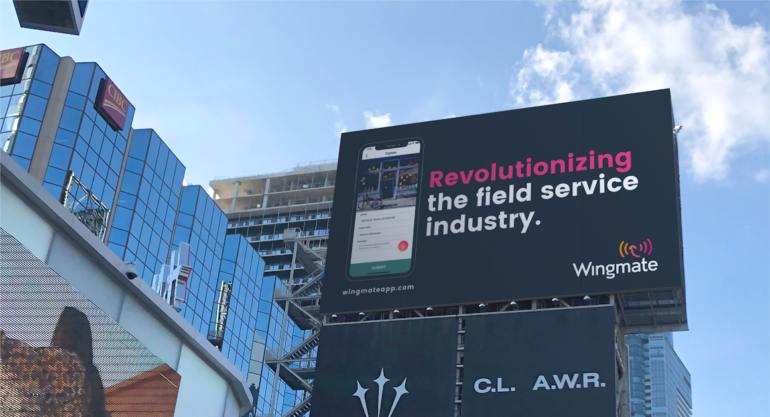A Toronto-based lead-generation and customer relationship management (CRM) startup may be the literal embodiment of the idea that one person’s garbage is another’s gold.
Wingmate, which closed a $1-million CAD round of debt and equity on May 8, began its life as a company called Gopher Leads, which was premised on the idea of having garbage truck drivers send back sales leads to front-office staff.
That startup didn’t fare so well, burning through its investor capital in two years. But in 2018, Matt Leuschner, who was working for that business in marketing, was asked to step in as CEO by the firm’s founder.
The original business idea was to have sanitation workers look for sales leads while out in the field.
In short order, as Leuschner tells it, he rebranded the firm to Wingmate and broadened out the business model. Originally, the plan was to have sanitation workers specifically look for sales leads while out in the field, but Leuschner said he expanded the idea out to other kinds of frontline workers.
Today, Wingmate provides frontline staff such as delivery drivers with an app that allows them to capture sales leads out in the field. When they share leads back to their corporate offices, they earn an incentive.
“We make sales and service a team sport,” Leuschner said.
Soon after the rebrand, Wingmate brought in its first large client, Purolator.
Leuschner told BetaKit that Purolator paid for a full year of service from Wingmate, which “gave us a little fuel in the tank to expand Wingmate into a CRM.” Five years later, Wingmate now employs 50 staff, and, according to Leuschner, has annual recurring revenue of close to $5 million.
RELATED: Report: AI Could boost revenues of Canadian CRM businesses by $32 million
The Southern Ontario Fund for Investment and Innovation led Wingmate’s recent funding round, with participation from BDC and an internal investor. Leuschner said Wingmate will put the money toward sales, marketing, and customer success.
In addition to being useful for sales, the app also acts as a simple, mobile CRM solution. Leuschner rhetorically asked why businesses of any type are continuing to spend two hours on data entry at the end of every work day instead of using Wingmate’s app.
“We believe there’s a massive opportunity there when it comes to traditional businesses,” he said, “people-driven businesses, that [have] staff in the field, that have an outside sales team.”
Wingmate’s CRM solution aims to reduce or eliminate time staff spend entering data.
The third service Wingmate provides is inside sales support. So by the time an outside employee such as a delivery driver has sent in a lead, for a new restaurant opening, for instance, a Wingmate employee will have called the new company, reached the decision-maker such as the restaurant’s general manager, determined if there’s a competitor in the sales account, and set up a follow-up appointment, according to Leuschner. If the lead were to pan out, the driver would earn an incentive.
Leuschner said the incentive can be cash right to an employee’s paycheque, or a point system. The incentives are automated and tied into the sale or service cycle payout reporting within the company, he said.
At its core, Leuschner describes Wingmate as a frontline intelligence tool. “It depends on the company and what they are looking for. We see service staff: drivers, routes, technicians using the app to capture new sales leads, upsell, cross-sell, service deficiencies, safety issues, competitor intel and customer insights, etc. It’s as easy as taking a picture.”
The most common type of sales lead would be a neighbouring business they do not service or an up-sell/cross-sell opportunity within an account.
Wingmate claims it has 300 customers, ranging from 10-person small-and-medium businesses, all the way up to large enterprise accounts like Purolator and Sysco Food Services. Revenue is generated using a traditional SaaS model, charging per user per month.
Originally, Wingmate had hoped to close the round months earlier, but like many startups, found investors cautious in the current bear market.
RELATED: How startups can survive a market downturn
That doesn’t deter Leuschner. He sees opportunity now where others are cutting back. “The opportunity is when Salesforce lays off 10 percent of its staff,” Leuschner said. “The opportunity is when there are gaps being created. Traditionally, they’d say, ‘Oh, we’ll just hire more salespeople,’ but now they’re saying: Maybe we can tap into our frontline staff.”
Leuschner noted that for a large telecommunications company, for instance, its technicians are already in homes and businesses. “They’re speaking to the customer already,” he said. “Why don’t we capture that upsell?”
But, in the original model, why garbage workers? It goes back to Louis Anagnostakos, co-founder of Toronto’s Turtle Island Recycling. GFL Environmental acquired the latter company in 2012, leading Anagnostakos to come up with the idea of starting Gopher Leads in 2015.
Gopher Leads offered a SaaS solution to generate solid leads for businesses. At the time, the platform consisted of a downloadable mobile application for frontline users and a browser-based CRM system for the management and sales agents. Gopher Leads empowered the frontline to generate the best leads for sales — and rewarded them with cash as those leads progressed.
“Whether for waste management or landscaping, Gopher Leads creates an extended sales-team arm with a company’s front line,” read a news release on the startup from 2016.
Back in the present, Leuschner addressed why the startup decided to take on debt rather than equity. He said currently the trend in technology is companies having to scale back because they’ve built their foundation off of investor money in equity.
“Wingmate’s done it a bit differently,” he said. “We’ve built a really strong foundation, and we see this time as an opportunity for growth.”
Image courtesy of Wingmate


